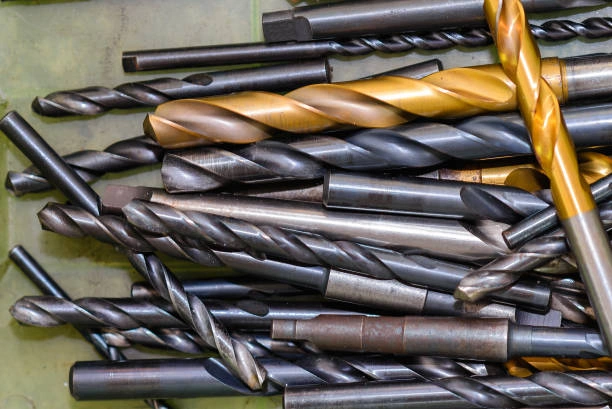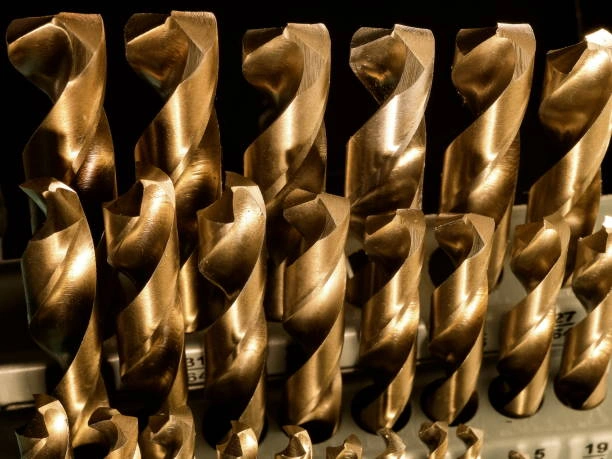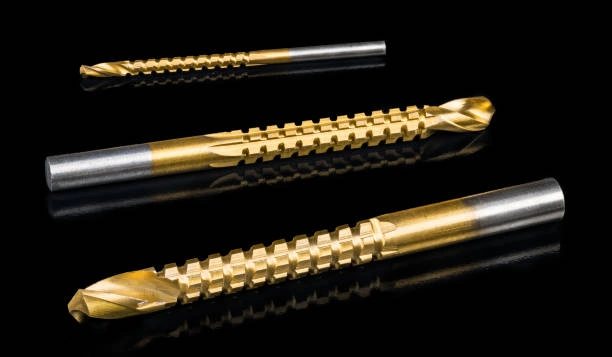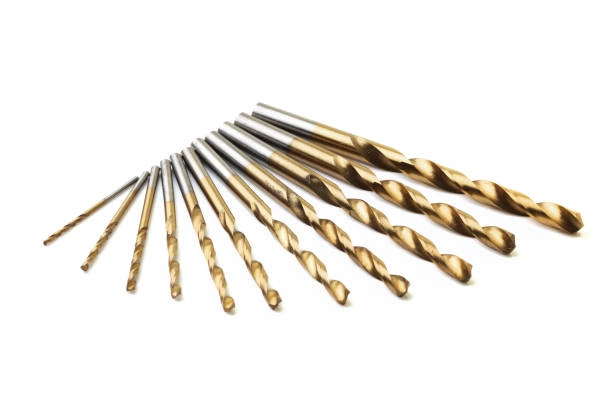As DIY enthusiasts and professionals alike, we constantly seek tools that offer the best balance of performance, durability, and value. When it comes to drilling, the drill bit is the unsung hero, and choosing the right one can make all the difference between a smooth, clean hole and a frustrating, time-consuming struggle.
One type of drill bit we often encounter is the HSS titanium drill bit. But what exactly is an HSS titanium drill bit, and why might we choose it for our projects? In this comprehensive guide, we’ll delve into the composition, benefits, and applications of these popular tools, helping you understand if they deserve a spot in your toolbox.
What is High-Speed Steel (HSS)?

Before we focus on the titanium coating, it’s essential to understand the base material: High-Speed Steel, or HSS. As the name suggests, HSS is a type of steel alloy specifically designed to withstand the high temperatures generated during high-speed drilling. We know that friction is our enemy when drilling, especially in harder materials, and HSS is engineered to retain its hardness and cutting ability even when things get hot.
Different grades of HSS exist, each with varying compositions of elements like tungsten, molybdenum, chromium, and vanadium. These elements contribute to the steel’s overall hardness, toughness, and heat resistance. For instance, you might come across HSS-M2 or HSS-M35 (often containing cobalt). Generally, higher-grade HSS will offer better performance and longevity, especially when working with tougher materials. So, when we talk about what HSS titanium drill bits are, the “HSS” part signifies a foundation of robust, heat-resistant steel.
The Added Advantage: What Does the Titanium Coating Do?

Now, let’s layer on the “titanium” part of the equation. These drill bits aren’t made entirely of titanium, which would be too soft and expensive for most drilling applications. Instead, a thin layer of titanium compound, most commonly titanium nitride (TiN), is applied to the surface of the HSS bit. This coating, though thin, provides several key benefits that make HSS titanium drill bits a popular choice:
- Increased Hardness: The titanium nitride coating is significantly harder than the underlying HSS. This increased surface hardness allows the drill bit to cut through materials more effectively and resist wear and tear for longer. We’ve all experienced the frustration of a dull drill bit, and a titanium coating can help extend the bit’s sharpness.
- Reduced Friction: The smooth surface of the titanium coating reduces friction between the drill bit and the material we’re drilling. This means less heat buildup during drilling, which is crucial, especially when working with harder materials like some types of steel or even certain hardwoods. Less friction also translates to smoother drilling and potentially faster material removal.
- Improved Corrosion Resistance: While the underlying HSS is susceptible to rust and corrosion over time, the titanium nitride coating offers a degree of protection against these elements. This can prolong the life of our drill bits, especially if we work in environments with some humidity.
- Enhanced Lubricity: The reduced friction also means the drill bit glides through the material more easily. This can be particularly noticeable when drilling softer metals or plastics, resulting in cleaner and more accurate holes.
When we ask what HSS titanium drill bits are, the answer includes a high-performance steel base enhanced with a hard, friction-reducing, and corrosion-resistant titanium coating.
Why Choose HSS Titanium Drill Bits?

Based on the properties we’ve discussed, HSS titanium drill bits offer several advantages that make them a go-to for many drilling tasks:
- Versatility: They are generally suitable for drilling a wide range of materials, including wood, plastic, and various metals, including softer steels and aluminum. This makes them a good all-around choice for our general-purpose drilling needs.
- Longevity: The titanium coating significantly extends the life of the drill bit compared to uncoated HSS bits, saving us money in the long run by reducing the frequency of replacements.
- Improved Performance: The increased hardness and reduced friction lead to faster, cleaner, and more efficient drilling, making our projects smoother and less strenuous.
- Good Value: While they might be slightly more expensive than basic HSS bits, the increased lifespan and performance often justify the cost for regular use.
Are There Limitations? When Might We Need Other Options?
While HSS titanium drill bits are a solid choice for many applications, it’s important to understand their limitations:
- Not Ideal for Very Hard Materials: For extremely hard materials like hardened steel or stainless steel, we might find that even with the titanium coating, these bits can dull relatively quickly. In such cases, specialized bits like cobalt drill bits or carbide-tipped bits might be a better investment.
- Coating Can Wear Off: The titanium coating is a thin layer and can eventually wear off with heavy use, especially if we’re not using proper drilling techniques or lubrication. Once the coating is gone, the bit will perform like a standard HSS bit.
- Sharpening Challenges: Sharpening titanium-coated drill bits can be a bit more challenging. We need to be careful not to remove the coating prematurely at the cutting edges.
Therefore, while HSS titanium drill bits are versatile, we need to consider the specific material we’re working with to ensure we’re using the most appropriate tool for the job.
Comparing HSS Titanium to Other Drill Bit Types

To truly understand the value of what is HSS titanium drill bits, it’s helpful to compare them to other common types:
- Standard HSS Drill Bits (Uncoated): These are the most basic type and are generally less expensive than titanium-coated versions. However, they wear out faster and are more prone to heat buildup. For occasional drilling in softer materials, they might suffice, but for regular use, the titanium coating offers a significant advantage.
- Cobalt Drill Bits (HSS with Cobalt): These bits contain a percentage of cobalt in the steel alloy itself, making them significantly harder and more heat-resistant than standard HSS. They are excellent for drilling stainless steel and other tough metals. While more expensive than titanium-coated HSS, they are often the preferred choice for demanding metalworking tasks.
- Carbide-Tipped Drill Bits: Carbide is an extremely hard material, and bits with carbide tips offer exceptional performance and longevity, especially when drilling very hard materials like masonry, tile, or hardened steel. They are generally the most expensive type but provide superior cutting power and durability in demanding applications.
- Black Oxide Drill Bits: These HSS bits have a black oxide coating that provides some corrosion resistance and reduces friction, but it’s not as hard or durable as a titanium nitride coating. They are often a good middle-ground option for general-purpose drilling.
Understanding these differences helps us appreciate where HSS titanium drill bits fit in the spectrum of drilling tools. They offer a good balance of performance and value for a wide range of materials, falling between standard HSS and more specialized options like cobalt or carbide.
When Should We Reach for Our HSS Titanium Drill Bits?
For general woodworking, they effortlessly drill pilot holes, screw holes, and larger openings in all types of timber. When working with plastics, they create clean, splinter-free holes in everything from PVC to acrylic. For soft metals like aluminum, copper, brass, or low-carbon steel, their titanium coating reduces friction to deliver smooth, efficient drilling.
Homeowners and DIY enthusiasts will love having them in their toolkit for routine repairs, furniture assembly, or home reno tasks—think hanging shelves or installing fixtures. They’re also perfect for light metalworking projects, like crafting small decorative pieces or repairing household metal items, where heavy-duty hardness isn’t required. With SEO-friendly keywords like “HSS titanium drill bits,” “soft metal drilling,” and “DIY home projects,” these bits blend performance and longevity, making them a go-to for anyone seeking reliable, everyday drilling solutions.
Tips for Getting the Most Out of Our HSS Titanium Drill Bits

To ensure we get the best performance and extend the life of our HSS titanium drill bits, here are a few essential tips:
- Use the Right Speed: Drilling at the correct speed for the material we’re working with is crucial. Softer materials generally require higher speeds, while harder materials need slower speeds to prevent overheating and dulling.
- Apply Consistent Pressure: Let the drill bit do the work. Applying excessive force can generate heat and damage the bit. Consistent, moderate pressure is usually best.
- Use Cutting Fluid (Lubricant): When drilling metal, using a cutting fluid can significantly reduce friction and heat, leading to smoother drilling and longer bit life.
- Secure the Workpiece: Ensure the material we’re drilling is firmly clamped or secured to prevent movement, which can damage the bit and create a messy hole.
- Start with a Pilot Hole: For larger holes, drilling a smaller pilot hole first can help guide the larger bit and improve accuracy.
- Keep the Bits Sharp: Regularly inspect our drill bits for signs of dullness. Sharpening them when needed will maintain their cutting efficiency.
By following these best practices, we can maximize the performance and lifespan of our HSS titanium drill bits.
Conclusion
HSS titanium drill bits are high-speed steel drill bits enhanced with a thin, hard titanium nitride coating that provides increased hardness, reduced friction, and improved corrosion resistance. This combination makes them a versatile and valuable tool for a wide range of drilling applications, offering a significant upgrade over standard HSS bits in terms of performance and longevity.
While they might not be the ultimate solution for extremely hard materials, for general woodworking, plastics, and softer metals, HSS titanium drill bits offer an excellent balance of performance, durability, and value, making them a staple in many of our toolboxes. Understanding their properties and knowing when to use them will undoubtedly lead to smoother and more successful drilling endeavors.


